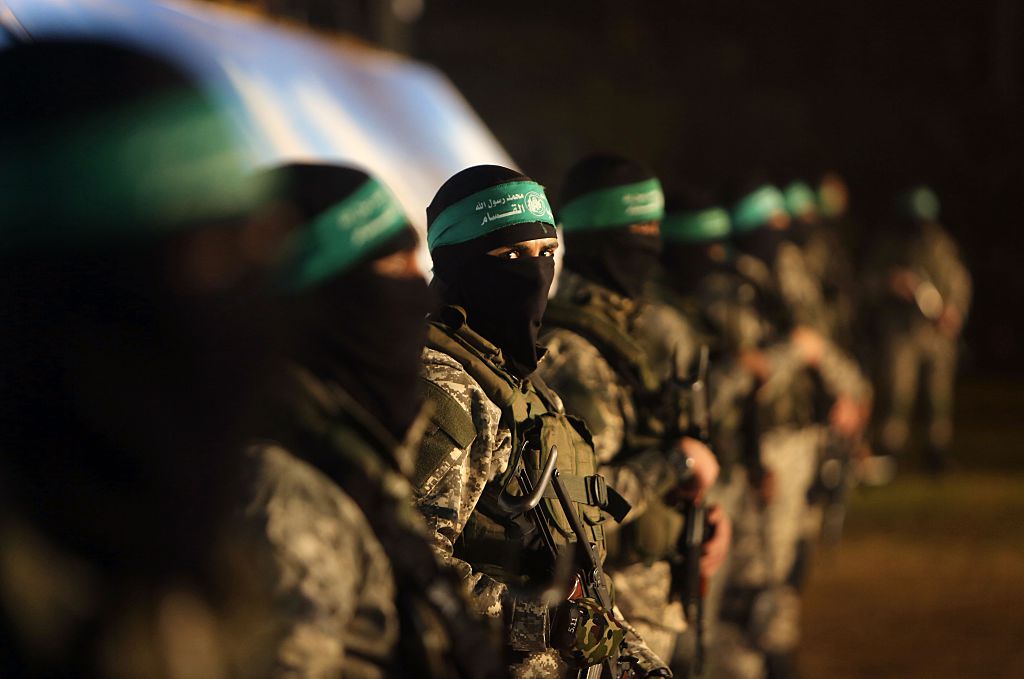What do people think of Hamas? In recent days, this has been something of a vexed question for many in the West, particularly those on the left. Among progressives, Jeremy Corbyn’s ‘friends’ have long been romanticised as Robin Hood types. But Robin Hood didn’t burn babies, didn’t rape and mutilate young women, didn’t take toddlers hostage, didn’t execute Holocaust survivors in the manner of Islamic State. The events of 7 October brought many liberals face-to-face with an uncomfortable test: do they have the mental agility to revise their opinions?
By comparison, let’s look at how the Arab world has answered that same question. Anecdotally, it seems that the merciless, drug-fuelled hyper-violence meted out by Hamas savages has provoked queasiness and concern even among natural supporters of the Palestinian cause.
Over the weekend, the former Hamas leader Khaled Mashal was given a remarkable grilling on Saudi television. ‘How can you demand that the West and the world in general, support the Palestinian cause, when the things that Hamas perpetrated against Israeli civilians are in the headlines?’, the interviewer demanded to know.
‘Is treating civilians this way part of Hamas’ ideology? Will you apologise for at was done to the Israeli civilians on 7 October?’ She also wanted to know how Hamas could expect the support of the Arab nations when it had not consulted them in advance of the attacks. Without wasting time on the blather that came in response, let’s just say that Mashal did not come across very well.
This hardening of attitudes reflects a general ebbing of support for Hamas, both across the Arab world and in the Palestinian territories, in recent years. In the UAE – which has signed a normalisation deal with Israel – and Saudi Arabia, support for the terror group has all but evaporated. When polled in August, just ten per cent of Saudis expressed a positive view of the terror group, while 48 per cent said their opinion was ‘very negative’.
Elsewhere, different countries present different pictures, but the overall trend is clear. In Qatar, Bahrain and Egypt, support for Hamas dropped by ten points in the period leading up to 2020, while in Jordan, 72 per cent supported Hamas in 2014, but this had fallen to 44 per cent in 2020.
Just ten per cent of Saudis expressed a positive view of the terror group
A similar story is playing in Hamas’ own backyard. While many Gazans support the group – 57 per cent were at least somewhat positive – a poll conducted in July showed that 62 per cent supported a continued ceasefire with Israel, while 50 per cent believed that ‘Hamas should stop calling for Israel’s destruction, and instead accept a permanent two-state solution’.
Seventy per cent favoured Gaza being handed to the Palestinian Authority instead of Hamas. For obvious reasons, the effect of the war has not yet been studied, but in the few telephone conversations I’ve had with Gazans over the last few days, it seems like resentment is growing towards the terror group. One contact told me that a significant number of people are now opposed to Hamas, but they would never dare say so out loud, ‘even one brother to another’.
When it comes to the two million Arabs living in Israel, the story presents one of the few narrow rays of light in the darkness. Despite pockets of extremism and concern about Israel’s military response, the Hamas brutality has cohered the Israeli-Arab community against the terror group and four-square behind Israel.
In an apt illustration of the tensions they face, an Arab bicycle shop owner from Tayibe in central Israel donated 50 children’s bikes to evacuees from the south. After his shop was burned down by extremists in retaliation, a crowdfunding campaign raised more than $150,000 (£122,000) to rebuild it.
Yet the threat from radicals is being significantly outweighed by good sense. A poll conducted by the Agam Institute found that 80 per cent of Arab-Israelis opposed Hamas’ attack – which after all, killed at least 15 of their number – while just five per cent supported it. These are not just dry figures.
In an attempt to galvanise the community behind Israel, many Israeli-Arab figureheads have spoken out. Although normally non-political, the Internet sensation Nuseir Yassin, founder of the online community ‘Nas Daily’, who has millions of followers, wrote in a column: ‘I identified as Palestinian-Israeli but now I’m Israeli first.’
Similarly, in a moving monologue to camera, the Arab-Israeli news anchor Lucy Aharish called for national unity. ‘We, the citizens of the state of Israel, all of us, left and right, secular and religious, Jews, Christians, Druze, Muslims, minorities and immigrants from all over the world, stand united together in this fight’, she said.
And Ella Waweya, the most senior Arab Muslim officer in Israel’s army – known to the Arab world as Captain Ella – recorded a message of her own. ‘We are all together defending and protecting our homeland and our state’, she said. ‘We are all Israeli, and we know why we are fighting.’ She signed off with a salute: ‘Long live Israel.’
The gruesome events of 7 October have created a geopolitical earthquake that is only just beginning. Across the Arab world and the West, an insurmountable faultline is appearing between Hamas and the rest, between liberal values and the forces of darkness, whether Russia, the Taliban, China, North Korea – who met recently in Beijing – or the jihadis from Gaza.
We view the polarisation through different prisms. Whereas in the Middle East, Hamas is often hated because of the suffering it is bringing upon its own people, the British left is grappling instead to fit the terror group into its own preoccupation with postcolonialism, anti-capitalism and identity politics.
But the question remains the same. The ultimate test of morality is where you stand when confronted with evil from those who you would naturally support. As the American writer Bari Weiss tweeted recently, ‘a lot of people woke up on 7 October as liberals and went to bed as conservatives’. We are living through an age of moral reckoning. It’s time to pick a side.
‘Israelophobia: The newest version of the oldest hatred’, by Jake Wallis Simons (Constable, £12.99), is out now







Comments